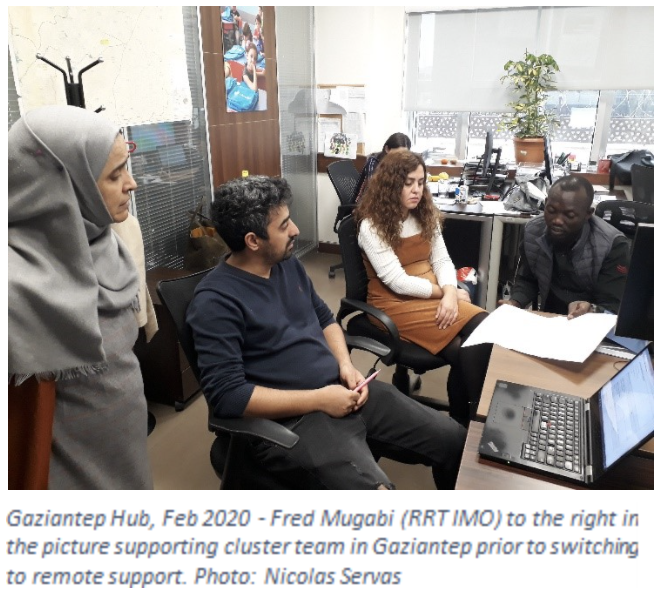Request support on coordination, information management, capacity development or other education in emergencies areas.
Demande de soutien en coordination, gestion de l’information, développement des capacités et autres domaines de l'éducation en situation d'urgence.
لطلب الدعم في مجال التنسيق ، إدارة المعلومات ، تنمية القدرات أو في اي مجال من مجالات التعليم في مناطق الطوارئ
Solicitar apoyo en coordinación, gestión de la información, desarrollo de capacidades u otra áreas en educación en emergencias.
It is not an understatement to say that 2020 was a very particular and challenging year due to the unprecedented global impact of the COVID-19 pandemic on children’s education.
Restrictions on travel and in-person meetings also presented new challenges for the Global Education Cluster Rapid Response Team (RRT) who are usually deployed to countries for up to 8 weeks for support missions. The RRT works closely with country coordination teams on different areas ranging from general coordination, information management support, to needs assessment and to more specific topics such as cash and voucher assistance, child safeguarding and participation, child protection, education in emergencies coordination. Learn more about the RRT here.
The pandemic had a notable impact on how RRT support is provided to country clusters and working groups, shifting to more online, remote support as direct in-country assistance was hindered by travel restrictions. While there was a learning curve to find the right balance between more frequent and effective communication when switching online, the RRT and countries team worked together to overcome this obstacle. Despite the uncertainty resulting from the pandemic around the ways of working, the RRT quickly and efficiently adapted their perspectives and methodologies to ensure critical support to countries was not disrupted.
“The pandemic presented an opportunity to identify alternatives to in-person deployments. It compelled us to do deliver our support and trainings virtually, finding innovative ways to engage with colleagues and partners” – Mame Khary Diop, GEC Rapid Response Team Member.
2020 RRT Support Highlights
Integrating Child Participation in Burkina Faso’s Needs Assessment
Mame Khary Diop, RRT Information Management Officer, provided remote support to Burkina Faso since May 2020, where the worsening humanitarian needs due to increased insecurity had major consequences for education. In March 2020 alone this resulted in the closure of 2,512 schools, disrupting learning for some 349,000 students. Against this backdrop, Mame remotely supported the BFA team with the Secondary Data Review (SDR) and the implementation of the GEC Joint Education Needs Assessment (JENA), building the capacity of the newly established cluster in this essential area. Support from Serena Zanella, RRT Child Safeguarding and Child Participation specialist, was critical in ensuring the successful integration of safe and ethical child participation in the JENA.
Swift Change in Priorities in Syria Deployment
Nicolas Servas, RRT Cluster Coordinator and Fred Mugabi, RRT Information Management Specialist, were deployed to Gaziantep, Turkey in February 2020 where their mission was to support the North-West Syria Education Cluster with the finalization of the Humanitarian Response Plan (HRP) and strengthening the coherence of monitoring data systems. They also strengthened preparedness and response measures by identifying capacity building areas in addition to reviewing and assessing that projects proposals of the Syrian Common Humanitarian Fund (SCHF) met the requirements. However, the sudden lockdown due to the escalating spread of COVID-19 during the mission prompted them to switch to the first GEC virtual deployment. In addition to changing the modality of the deployment, response priorities quickly shifted as well. Due to the pandemic the RRT were critical in supporting the cluster’s assessment, proposal and review of distance learning modalities. They also supported the cluster in developing advocacy documents to inform parents and caretakers on how to create a protective at-home learning environment. These were key when shifting to digital school modalities which were critical to mitigating disruptions to learning in the midst of the pandemic.
Strengthening Local Participation in the Iraq Cluster
One of the main outcomes for Kemal Alp Taylan, our RRT Localization Specialist, during his remote mission to Iraq from August to October 2020 was to develop a localization strategy for the cluster. He successfully identified opportunities to better connect Federal and Regional ministries with local actors, and engaged in subnational coordination meetings led by national NGOs in Arabic or Kurdish. Alongside strengthening these relationships at the national level, Kemal supported the monitoring and reporting processes, reviewed capacity needs and produced a dashboard on localization showing the level of engagement of actors involved.
The examples above are only handful of instances showcasing the unwavering commitment of our RRT to ensure country teams receive quality support to meet the growing education needs of crisis affected children and youth despite COVID-19 restrictions; see the 2020 RRT support dashboard here.

